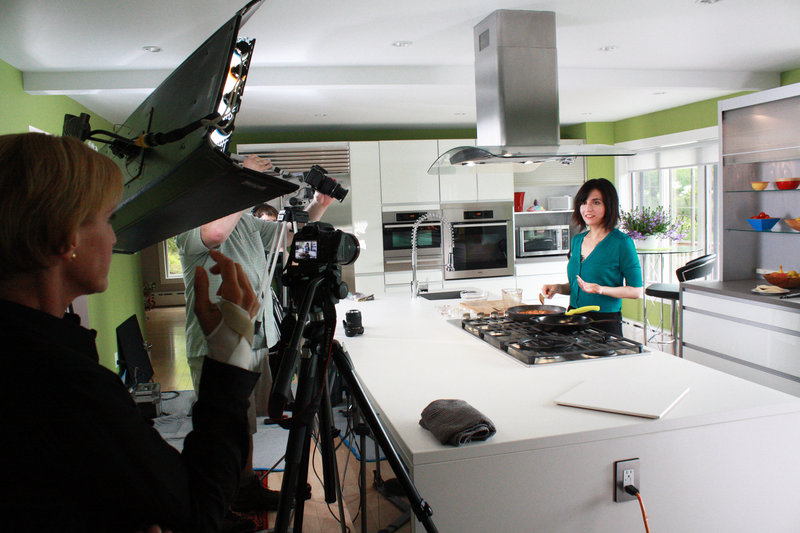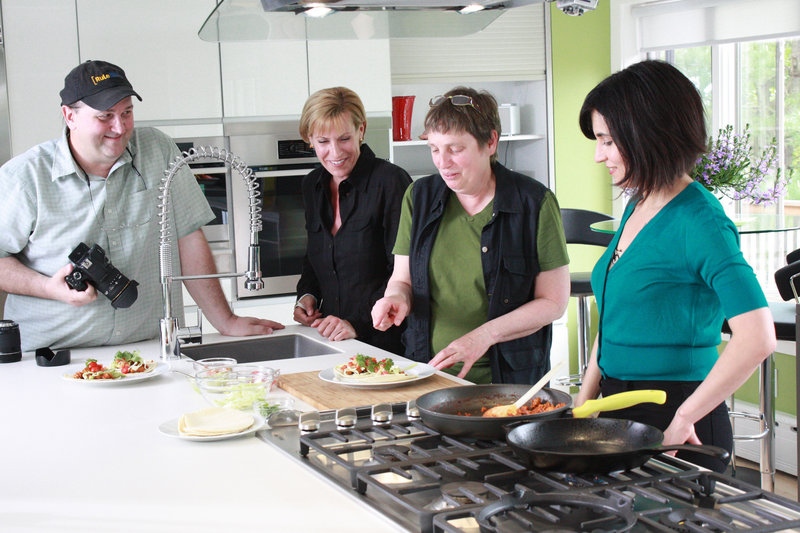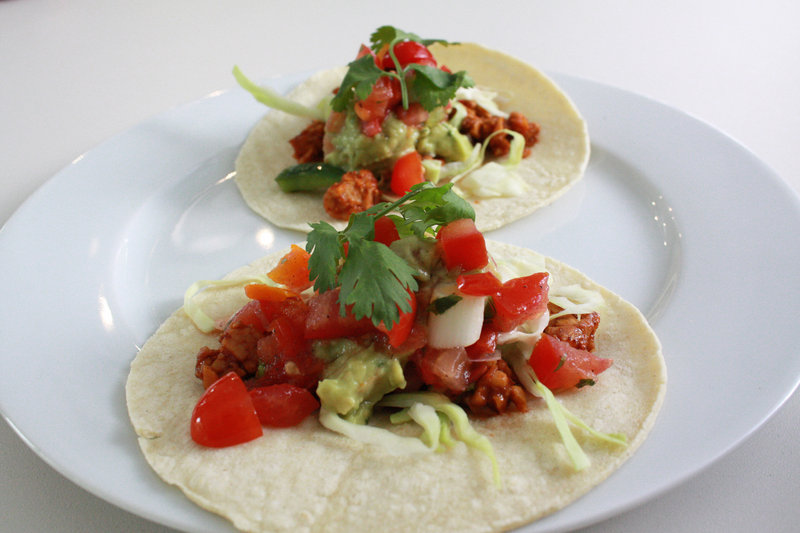Inside a light-drenched modern kitchen in Cumberland, New York City chef and best-selling vegan cookbook author Terry Hope Romero positions herself behind the gas cooktop and looks into the camera.
“Rolling ‘A’ camera,” says cinematographer Tom Pierce as he switches on the lead camera. “Give us a clap over the ingredients.”
Romero claps and then begins speaking to the camera about her love for tempeh tacos.
“What I like to do with this is braise the tempeh,” Romero says as she drops chunks of tempeh into a frying pan. “This is really my favorite way to prepare tempeh.”
But that’s about as far as she gets before filming stops. Producer Betsy Carson notices that a bottle of olive oil is blocking the view from one of the cameras. The bottle is moved, and filming resumes.
A loud sizzle erupts as she adds a marinade to the pan.
“Look at that smoke,” Romero says to the camera. “Everyone’s going to be like, ‘What are you making?’ “
In addition to making tempeh tacos, Romero was in Maine making a new cooking show. Called “Vegan Mashup,” the show is being produced by Delicious TV, the Maine production team behind the “Totally Vegetarian” cooking show starring Toni Fiore, which has been airing nationally on PBS since 2005.
Fiore, who lives in Maine, is one of the hosts of “Vegan Mashup,” along with Romero and cookbook author Miyoko Schinner, whose latest book “Artisan Vegan Cheese” is due out later this year. “Vegan Eats World,” Romero’s next cookbook, is slated to hit store shelves in November.
” ‘Vegan Mashup’ is a spin-off of my last show,” Carson said. “I wanted to get more chefs and get more people cooking, and to show how popular plant-based recipes are.”
Filming for the show is now complete, and Carson and her team are in the production phase, editing video and creating promotional materials. When the show is ready to air, it will be made available to PBS stations nationwide. Because every PBS station is locally owned and operated, the decision to pick up the show will be made by the individual stations.
The first season will feature six episodes and be available to air beginning in September. Each episode features three to four recipes and has a different theme.
The episodes in the first season will explore breakfast, cheap eats, appetizers, holidays, teen-friendly meals and Mediterranean dishes.
The day I visited, the team was filming segments for the holiday show, the breakfast show and the teen cooking show. The previous day, chef Cathi DiCocco of Cafe DiCocoa in Bethel was on the set cooking a Mediterranean meal.
Other chefs who make cameo appearances in the first season include Portland chef and Girl Gone Raw Elizabeth Fraser; chef, cookbook author and activist Bryant Terry; and chef, cookbook author and podcast host Colleen Patrick-Goudreau.
“We’re really trying to focus on good, healthy food you can prepare in quantity on a budget,” Fiore said.
When I ask if there’s a script to follow, Fiore tells me, “basically, it’s unscripted. We just talk about the recipes and what’s important.”
Or as Romero interjected, “It’s very ad-lib.”
The filming equipment includes a helmet camera mounted to the underside of the range hood, a Panasonic HD video camera and a Canon DSLR, which is a point-and-shoot camera that also records HD video.
According to Fiore, the key to filming a cooking show is “getting everything wiped clean and starting each take like it’s your first.”
Fiore wipes down the set between each take.
“In HD, you see every little thing,” Pierce said. “So we have to be more careful.”
Before I arrived on the set, Romero cooked up raspberry corn muffins for the breakfast episode and sweet potato chipotle soup for the holiday episode. Romero said the key to filming cooking shows is pacing the demonstration properly and having ingredients prepped and ready to go.
“You always want to be fast,” Romero said. “Not everyone wants to see you chopping garlic. You have to decide what people really want to know.”
Carson used the crowd funding site Indiegogo to raise $2,200 in seed money to get the project off the ground. She’s also picked up sponsorships from Friends of Animals, Maine Animal Coalition, the Boston Vegetarian Society and the San Francisco Vegetarian Society.
“I’m hoping to get more sponsors so we can roll right into another season,” Carson said.
PBS does not pay for shows, so to fund shows that air on its member stations, producers need to raise money through sponsorships.
“A lot of (PBS) shows will get giant sponsors for $100,000 to $400,000,” Carson said. “I’d like raise another $10,000.”
Staff Writer Avery Yale Kamila can be contacted at 791-6297 or at: akamila@pressherald.com
Twitter: AveryYaleKamila“
Send questions/comments to the editors.





Comments are no longer available on this story